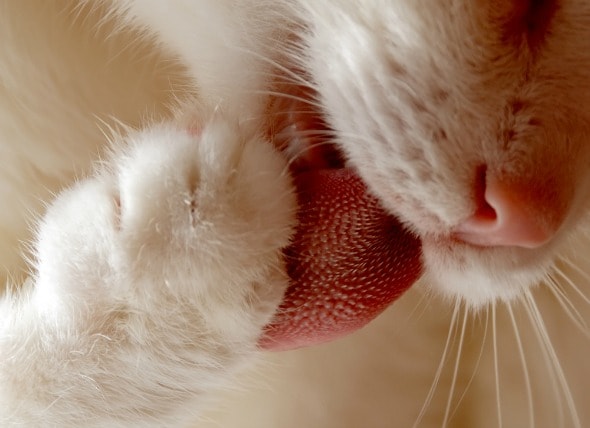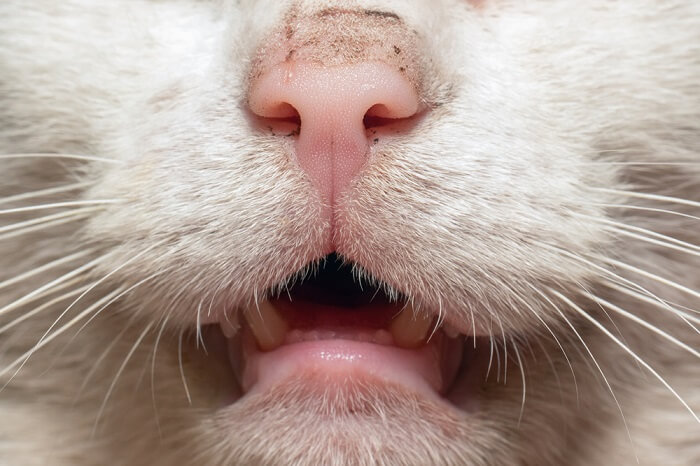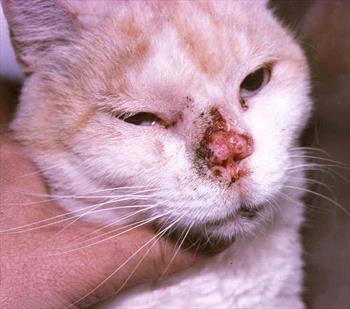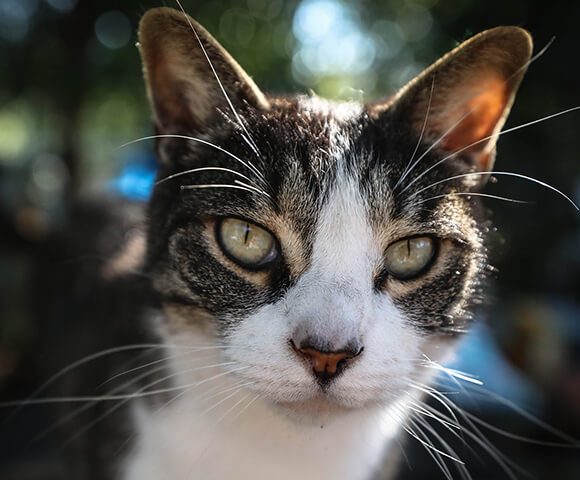sarcoma in cats jaw
The symptoms of osteosarcoma in cats can be subtle and they may include. Swelling or a mass.

Tongue Cancer Squamous Cell Carcinoma In Cats Petmd
Bone cancer causes an abnormal swelling to develop in the affected part of the skeleton.

. Fibrosarcomas arise from the connective tissues within the mouth often from the jaw bones. Although squamous cell carcinomas dont spread rapidly to other parts of the body oral tumors may be locally invasive and spread to the chest. Ad Help your pet cope with symptoms like nausea loss of appetite and energy.
Cancer arises from osteoblasts or osteoclasts which are cells that produce a matrix which builds or breaks down bone. The histiocytic type of skin mast cell tumor in cats is seen primarily in Siamese cats younger than 4 years old. Tumors may develop anywhere on the body and appear as multiple small less than 04 inches 1 centimeter in diameter firm lumps under the skin surface.
Usually animals that experience problems with teeth refuse to eat. The two most common types of oral cancers that occur in cats include squamous cell carcinomas and fibrosarcomas. Oral squamous cell carcinoma is cancer of the lining of the oral cavity including the gingiva gums tongue palate and tonsils.
This is often the first sign of. Sarcomas are a specific type of cancer. Signs may include bad breath halitosis drooling panting movement or loss of teeth lack of appetite or difficulty eating reluctance to be touched on the head facial swelling and swelling of the lymph nodes.
Tumors are locally invasive and can extend into the bones of the upper or lower jaw. If the tumor is larger a more invasive surgery may be necessary to remove the growth and possibly part of the bone or jaw near it. Oral pain is usually apparent especially in cats with tumors that have penetrated the underlying bone.
An aggressive form of oral cancer in cats oral squamous cell carcinoma or SCC is an extremely invasive tumor that attacks the jaw bone. If an osteosarcoma develops elsewhere in the skull or vertebrae swelling and pain in the. Other common causes of oral tumors in cats are fibrosarcomas osteosarcomas and odontogenic tumors.
They present as a subcutaneous beneath the skin lump and are malignant tumors arising from transformed cells. The symptoms of bone cancer in cats include physical swelling lameness an abnormal gait and general unwellness. The physical swelling of the cancer causes mechanical.
Get NHVs most useful pet cancer supplements in one holistic pack. In cats the roots of the teeth are located deep in the gum tissue therefore the affection of the fang tooth by decay can lead to the formation of a seal in the lower jaw. Osteosarcomas can also develop in the skull most commonly in the oral cavity pelvis ribs and vertebrae.
Your veterinarian may recommend radiation therapy after surgery to ensure that the cancer has been entirely eliminated. Osteosarcoma osteogenic sarcoma is an aggressive and destructive type of primary cancer that develops in the bones. Because these tumors occur so infrequently its hard to determine a general prognosis.
Lameness that doesnt go away and swelling of the affected bone. Cats with osteosarcoma of the jaw a form of axial osteosarcoma may have swelling of the jaw difficulty opening the mouth excessive salivation and may be reluctant to eat due to pain. Causes Treatments Prevention and Tips.
The cancer causes pain. Bone Cancer in Cats. Bone Cancer in Cats.
After many visits it was discovered that the lump was actually some sort of tumor but the vet wouldnt know exactly which kind without a biopsy. Osteosarcomas arise solely from bony tissues such as the jaw bones. Older cats generally have fewer tumors.
Cats suffering from oral tumors often develop jaw cancer or cancer in the oral cavity. No pain when touching. The whole episode started right around Christmas when he was showing signs of bad pain.
Symptoms How can you know if your cat has osteosarcoma. It is the most common oral cancer in cats. Odontogenic tumors arise from the tissues making up the teeth.
There are different forms of sarcoma that develop in cats. Bloody nose Mouth pain Halitosis bad breath Weight loss Facial swelling Dropping food during a meal Increased salivation Bleeding. Most pet owners realize their cat has developed a health problem after noticing some or all of the following symptoms.
These are the most common symptoms when a tumor affects. My cat Momo is 9 years old and has a tumor on his jaw. Jan 12 2015.
Bone cancer causes a number of signs of unwellness for two main reasons. Often the symptoms will depend on the area of the body the cancer is affecting. Although there is no specific cause of mouth cancer in cats the following environmental and dietary factors may contribute to the growth of malignant tumors in the oral cavity.
Feline sarcoma also known as soft tissue sarcoma is a type of cancer that develops in the connective tissues in petsAlthough these soft tissue tumors can arise anywhere in the cats body they commonly develop on the skin or subcutaneously. The rate of metastasis at the time of diagnosis is low. It is the most common type of bone cancer in cats and accounts for 70 of bone tumours.
Although squamous cell carcinoma and fibrosarcomas are the most common feline mouth cancers Kitty might also develop granular cell tumors lymphoma melanoma osteosarcomas and even more rare cancers in his oral cavity. Jaw If the cancer is affecting the jaw you might notice they are having trouble opening their mouth and eating or lots of saliva in their mouth. Most cats recover well even when part of the jaw has been removed.

Common Oral Tumors In Cats And Dogs Vet In Aurora The Animal Dental Clinic

Oral Tumor Changes Cat S Eating Habits Boston Herald

Oral Tumors In Dogs And Cats Paws Into Grace

Cancerous And Non Cancerous Growths In A Cat S Mouth Petmd

The Pet Oncologist Vet Oncologist Online Oral Cancer In Cats

Mouth Cancer In Cats Causes Symptoms Treatment All About Cats

Learn About Osteosarcoma Bone Cancer In Cats Petcure Oncology

Feline Oral Squamous Cell Carcinoma An Overview

Nasal Squamous Cell Carcinoma In Cats Veterinary Partner Vin

Mouth Cancer Gingiva Squamous Cell Carcinoma In Cats Petmd

Coping With Cat Cancer Symptoms And Advice Blue Cross
/GettyImages-11673268481-ff230807a7e04e2db8e38e148edb19a5.jpg)
How To Treat Fibrosarcomas In Cats

Common Causes And Treatment For Sneezing In Cats Firstvet

Neoadjuvant And Adjuvant Doxorubicin Chemotherapy In A Case Of Feline Soft Tissue Sarcoma

Mouth Cancer Melanocytic In Cats Petmd

Adopt Tori Senior Declawed Cat Offered By Owner On Petfinder Kitten Adoption Cat Adoption Cats

Oral Squamous Cell Carcinoma In Cats An Overview Vet In Aurora The Animal Dental Clinic

